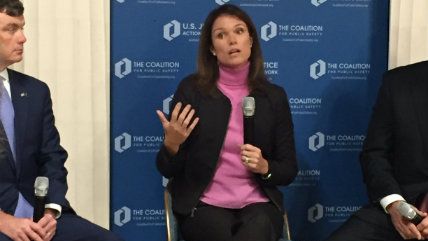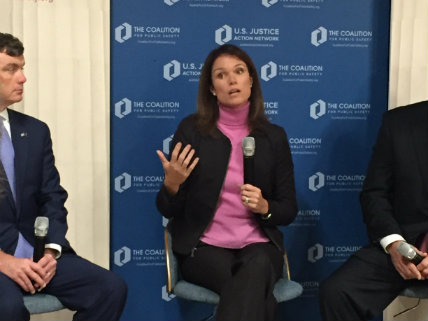This Republican Florida Prosecutor Wants to Start the State's First Conviction Integrity Unit
Melissa Nelson ousted notorious Florida prosecutor Angela Corey. Now she wants to turn her office around.


Incoming Florida state attorney Melissa Nelson is inheriting some big shoes to fill. Unfortunately, they happen to be clown shoes, and she would prefer something a bit more professional.
A former assistant state attorney for 12 years before she moved to private practice, Nelson won the race for Florida's 4th Judicial Circuit State Attorney after demolishing her opponent, incumbent two-term state attorney Angela Corey, by 64 to 26 percent in the GOP primary earlier this year.
Corey has been called, among other things, "the cruelest prosecutor in America" and "one of the most reviled prosecutors in Florida." Corey was most notable for prosecuting—and failing to convict—George Zimmerman. She also sent a woman to prison for 20 years who fired two warning shots to deter her allegedly abusive husband and charged a 12-year-old as an adult for first-degree murder. In addition, Corey was notoriously thin-skinned and had a habit of calling her many critics to threaten them, including the Florida Times-Union, the Southern Poverty Law Center, and professors at Florida State University and Harvard Law School.
Corey was one of a number of controversial prosecutors that was booted out of office in November. Nelson, speaking at a forum Tuesday in Washington, D.C. hosted by the U.S. Justice Action Network, a criminal justice advocacy group, said her victory was part of that wave of backlash from voters.
"I don't care if its a box of six jurors or twelve jurors or an electorate of thousands, people crave fair outcomes," Nelson said. "We learn it on the ball field when we're kids. People want to know that the system is fair, and that was the common denominator. This election wasn't about me. I was a tool. This was my community's repudiation of a system and an office they felt was imbalanced and no longer fair, that had lost its way."
To restore the public trust, Nelson says she wants to increase the diversity of lawyers in her office, create better diversion programs for juveniles, change the way prosecutors handle potential death penalty cases, and create Florida's first conviction integrity unit—a special team of prosecutors that reviews cases looking for wrongful convictions.
It's a fairly remarkable agenda for a Republican, NRA-endorsed prosecutor whose constituents include two of the most conservative counties in the U.S. After the forum, Reason caught up with Nelson to ask about her plans as she prepares to enter office on Jan. 3. The following interview has been edited for length and clarity.
REASON: You talked a lot about the way things were done under your predecessor. What's your plan going forward, and how do you hope to change that?
NELSON: One of the things I didn't talk about that matters is the metrics of success. How do we reward prosecutors? What do we teach them is good? I met with The Innocence Project on Friday, actually. We're trying to put together a conviction integrity unit, which would be the first in Florida if I can do it. I'm very excited about the prospects. One of the things [The Innocence Project] shared with me that I loved is the idea of rewarding young prosecutors for doing justice. They told me an example of a prosecutor dropping a case. He understood that, because he had so much leverage, he could likely have obtained a plea, but he didn't think it was the right thing to do, so he dropped the case. He was called in, and he thought he was going to be fired. The D.A. actually acknowledged him in front of the whole office. Instead of the metric being how many cases you try, how many convictions you obtain, how many people you put in prison, the idea is: Did you do the right thing? I want to change the culture and thinking process to one of service. We're tasked with protecting the public and seeking justice.
REASON: One thing you hear a lot of former prosecutors talk about is this "win, win, win" mentality.
NELSON: Win at all costs. When I talk about trust in the community, all it takes is one case where it's proven you fudged. You know, didn't play fair. Then it affects every case and undermines every conviction. Do the right thing every day. I was with my husband having coffee, and I said, "I really hope I have some time to build some credibility before I'm faced with a very serious challenge and end up in front of a podium." He said, "Just do the right thing. It's that simple."
REASON: We were talking about juvenile justice earlier. Florida has "direct file," which allows prosecutors to charge juveniles in adult court at their discretion. Your predecessor came under a lot of criticism for the number of juveniles she charged as adults. How will your office decide when that's appropriate?
NELSON: We're going to create and publish, so the public can see it, criteria for direct file. I will make sure the office retains the ability for outlier cases to direct-file a juvenile if appropriate, but there will be criteria the public and the defense bar can rely on that we will use as factors in making the decision. Then the direct file decisions—in the last eight years they were made only in the the juvenile division—are going to go up to the highest level of leadership. I have two chief assistants and one of them is tasked with looking at every direct file decision. He will be a backstop.
REASON: The Harvard Law School's Fair Punishment Project found that several "outlier" death penalty counties—counties that return a high number of death penalty sentences—are in Florida. Prosecutors play a large part in this. How will your office handle potential death penalty cases?
NELSON: That's the most serious decision in the state's attorney office. Our state supreme court has just indicated, and hopefully our legislature will enact legislation this spring to reflect this decision, that unanimity is required in a death recommendation. [Florida was, until recently, one of two states in the U.S. that allowed judges to impose death penalty sentences on non-unanimous jury recommendations.] This means, on the front end, prosecutors have to be all the more careful about the cases where they intend to seek death. Whereas twelve months ago, prosecutors might pursue it if they thought it was appropriate, now you have to ask yourself if twelve people will also agree, which is a high standard. In my office, prosecutors had the unilateral ability to seek death. No longer. We're going to do what Miami-Dade does, which is a review board. So if a prosecutor thinks it's appropriate to seek death, they're going to have to come before the review board and make their case. We're going to invite the defense as well to bring their mitigation, so that we get the decision right up front.
REASON: You started out as an assistant prosecutor, and then did some criminal defense work, and now you're going to be a state attorney. How did that defense work change your perspective going into your new job?
NELSON: My dad was a law enforcement officer, and I as a prosecutor believed that I respected the power I had. It wasn't until I had a client and I was on the other side of the table that I really came to appreciate all the contours of the government's power—when I had a client who had to respond to a subpoena that affected their business, or when I had a client facing life in prison. That power, I now have a different respect for it that will hopefully inform the decisions I make in a better way.